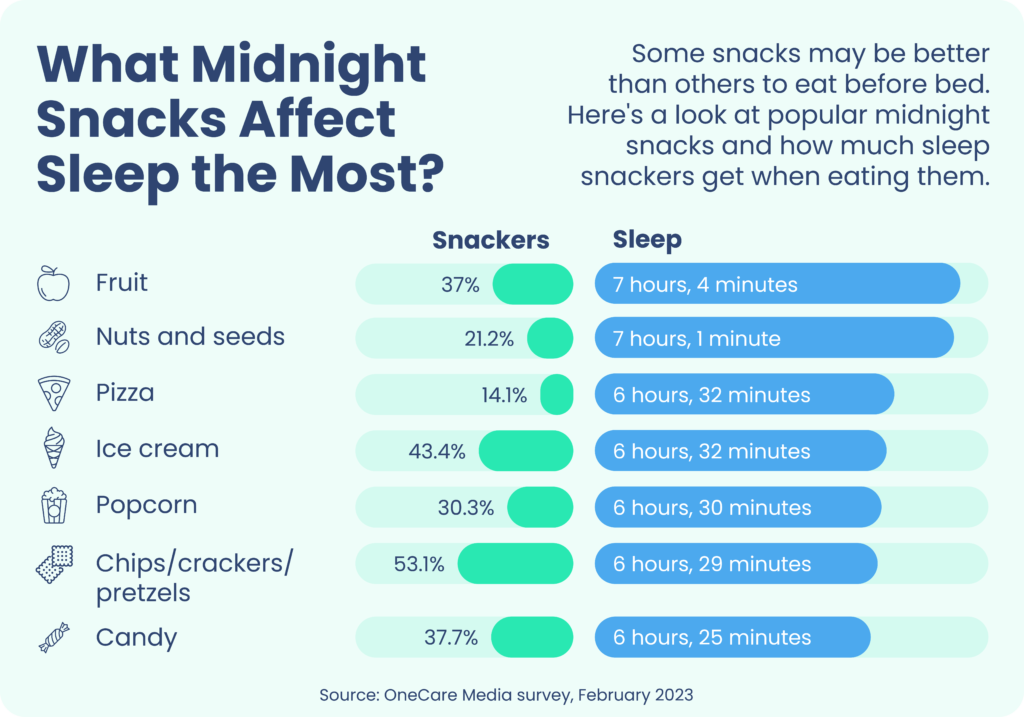How Often Do We Eat Before Bed, and How Bad Is It for Us?
- 93% of U.S. adults have an after-dinner snack at least once a week, according to a survey.
- On average, adults snack before bedtime 3.9 nights each week.
- Chips, crackers, and pretzels are the most popular bedtime snacks.
- Adults who snack on nuts, seeds, popcorn, and fruit may sleep 30 more minutes each night than those who snack on sugary and salty snacks.
- 49.4% of non-snackers report feeling productive most days, compared to 43% of adults who snack six or seven nights each week.
Payal Dhar often eats late at night. The 47-year-old freelance journalist often works late to focus; she has autism and says daytime can be overstimulating. But the packaged snacks and processed-food items she reached for weren’t always satisfying.
“My sleep quality would be poor,” she says, “and I’d get up feeling ill sometimes.”
Conventional wisdom is that eating too much or too close to bedtime can sabotage your sleep or even make you feel sick. Many of us do it, however: 93% of U.S. adults have an after-dinner snack at least once a week, according to a February 2023 survey by Sleep Doctor, the parent company of SleepFoundation.org. On average, men and women snack after dinner almost four times a week. And the more survey respondents snack, the later they go to sleep.
Got a hot tip? Pitch us your story idea, share your expertise with SleepFoundation.org, or let us know about your sleep experiences right here.
But 58.5% of respondents say they feel satisfied after their snack, compared to 21.8% feeling stuffed, 16% feeling guilty, and 15.2% feeling bloated. Adults who snack every night even reported sleeping one minute longer each night than those who never snack.
So is there a secret sauce to eating before bed? Is that midnight snack really so bad after all?
Want to Eat Before Bed? Watch the Clock
Dr. Abhinav Singh, medical director of the Indiana Sleep Center in Greenwood, Indiana, and a SleepFoundation.org medical-review panel member, says timing is everything. Eating is a bedtime ritual that can affect our sleep. Wait at least three hours from putting down the dinner plate to climbing into bed, he says.
“A heavy meal in the evening will make more work for your gastrointestinal tract,” Dr. Singh says. “If you eat a lot at [and go right to bed], your sleep quality will be poor because everything [in your system] is awake.”
For the most part, U.S. adults follow that recommendation. On average, survey respondents eat dinner around 6:30 p.m. and snack after dinner at 8:33 p.m. with a bedtime of 11:10 p.m. Some 69.9% have that snack within two hours of dinner.
What we eat does matter, too. Most of us don’t go the nutritious route.
Our ability to make smart food choices diminishes when we are tired , says Taylor Wallace, Ph.D., CEO at Think Healthy Group and an adjunct professor in the Department of Nutrition and Food Studies at George Mason University in Fairfax, Virginia. People consume less healthy foods at night, adding extra calories, sugar, salt, and saturated fat, he adds.
That could help explain why the most popular night snacks among survey respondents were chips, crackers, and pretzels, with 53.1% choosing those foods as a go-to. They were No. 1 among men and women.
Sugary snacks are also favored, with 43.4% choosing ice cream, 42.8% having cake or cookies, and 37.7% grabbing candy.
Healthier snack options are less desired. Fruit is a choice for 37% of bedtime snackers, followed by popcorn (30.3%), cereal (28.1%), seeds and nuts (21.2%), and cheese (20%).
But those folks may be onto something when it comes to bedtime snacking and sleep quality.
Better Snacks May Lead to Better Sleep
Respondents who choose healthier snack options report sleeping at least 30 minutes more each night than those who snack on pizza, chips, crackers, pretzels, and candy.

For example, people who snack on seeds and nuts reported sleeping 7 hours, 1 minute per night, compared to 6 hours and 25 minutes for candy snackers.
That could be because of the stabilizing power of fiber.
“Fiber is very filling and helps to manage blood sugar,” says Neil Edward Levin, senior nutrition education manager at NOW Foods, a natural-foods company. High-fiber foods such as popcorn, raw fruits and vegetables, and whole grains can keep your blood sugar stable through the night. Low blood sugar could leave you hungry at night.
Snacks can play a role in your sleep onset latency, or how long it takes you to fall asleep, too. According to the survey, 41.6% of adults who have a late-night snack less than two nights a week fall asleep within 20 minutes, considered normal. Among adults who snack six or seven nights a week, that drops to 32.6%.
Additionally, people who snack every night have later bedtimes. Every-night snackers reported an average bedtime of one hour later (11:37 p.m.) than those who never snack (10:37 p.m.). And only a third (33.2%) of folks who snack six or seven nights a week consider themselves morning people, compared to 43.7% of non-snackers.
Non-snackers may feel better, too. Nearly half (49.4%) of adults who never snack after dinner say they feel productive most days, compared to 43% of people who snack six or seven nights a week. Greater percentages of non-snackers say they regularly feel well-rested and physically sound, as well.
Why? Studies have shown that snacking at night may lead to a higher body mass index or BMI , which is considered a sign that someone is carrying excess weight. Other research suggests that people with a healthier BMI sleep longer .
Dr. Singh concurs. Generally, people with lower BMI and those who consider themselves physically fit are less likely to snack at night, more likely to have healthy sleep habits, and make healthier snack choices before bed, he says.

Making the Right Snack Choices
To get better sleep, make better nighttime snack choices, experts say. Wallace says to avoid overly caloric foods and those that contain refined grains or added sugars.
If you are prone to acid reflux or heartburn, avoid spicy and heavy foods before bed, Levin says.
And steer clear of foods such as chocolate that may have hidden caffeine and can make it hard to fall asleep, Dr. Singh says.
A small snack before bedtime can help ensure you’re not hungry when trying to sleep, however. Dr. Singh says a small snack 30 to 40 minutes before bed is fine if you feel a little hungry. One study even suggests a high-protein bedtime snack can help active people build muscle and reduce morning hunger.
For a healthy bedtime snack, Dr. Singh suggests incorporating foods that promote a good night’s sleep.
“Cherries and pistachios have some tryptophan and melatonin,” he says. “That may give you that little drowsiness or initiation of sleep effect.”
For Dhar, practicing intuitive eating and being more conscious about her late-night snacking was the key to finding her food/sleep sweet spot.
“It helped a lot,” Dhar says. “I let my body decide what I want, and if I even want to eat.”
Methodology
The survey commissioned by Sleep Doctor, the parent company of SleepFoundation.org, was conducted on the online survey platform Pollfish on Feb. 3, 2023. Results are from 1,250 survey participants in the United States who were ages 18 and older at the time of the survey. All respondents attested to answering the survey questions truthfully and accurately.
References
5 Sources
-
St-Onge, M. P., Wolfe, S., Sy, M., Shechter, A., & Hirsch, J. (2014). Sleep restriction increases the neuronal response to unhealthy food in normal-weight individuals. International journal of obesity (2005), 38(3), 411–416.
https://pubmed.ncbi.nlm.nih.gov/23779051/ -
U.S. National Library of Medicine (July 30, 2022). Snacks for adults: MedlinePlus Medical Encyclopedia., Retrieved February 20, 2023.
https://medlineplus.gov/ency/patientinstructions/000338.htm -
Barrington, W. E., & Beresford, S. A. A. (2019). Eating Occasions, Obesity and Related Behaviors in Working Adults: Does it Matter When You Snack?. Nutrients, 11(10), 2320.
https://pubmed.ncbi.nlm.nih.gov/31581416/ -
Potter, G. D. M., Cade, J. E., & Hardie, L. J. (2017). Longer sleep is associated with lower BMI and favorable metabolic profiles in UK adults: Findings from the National Diet and Nutrition Survey. PloS one, 12(7), e0182195.
https://pubmed.ncbi.nlm.nih.gov/28750055/ -
Kinsey, A. W., & Ormsbee, M. J. (2015). The health impact of nighttime eating: old and new perspectives. Nutrients, 7(4), 2648–2662.
https://pubmed.ncbi.nlm.nih.gov/25859885/













































































